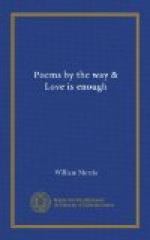Come, see thy kin in the feasting-hall,
And tell me if thou knowest them all!
O son, O son, we are blithe and fain;
But the autumn drought, and the winter rain,
The frost and the snow, and St. David’s wind,
All these that were, time out of mind,
All these a many times have been
Since thou the Upland Town hast seen.”
Then never a word spake Goldilocks
Till they came adown from the wheaten shocks.
And there beside his love he stood
And he saw her body sweet and good.
Then round her love his arms he cast:
“The years are as a tale gone past.
But many the years that yet shall be
Of the merry tale of thee and me.
Come, love, and look on the Fathers’ Hall,
And the folk of the kindred one and all!
For now the Fathers’ House is kind,
And all the ill is left behind.
And Goldilocks and Goldilocks
Shall dwell in the land of the Wheaten Shocks.”
LOVE IS ENOUGH
OR
THE FREEING OF PHARAMOND
DRAMATIS PERSONAE
GILES, } Peasant-folk.
JOAN, his Wife, }
THE EMPEROR.
THE EMPRESS.
THE MAYOR.
A COUNCILLOR.
MASTER OLIVER, King Pharamond’s Foster-father.
A NORTHERN LORD.
KING PHARAMOND.
AZALAIS, his Love.
KING THEOBALD.
HONORIUS, the Councillor.
LOVE.
LOVE IS ENOUGH
ARGUMENT
This story, which is told by way of a morality set before an Emperor and Empress newly wedded, showeth of a King whom nothing but Love might satisfy, who left all to seek Love, and, having found it, found this also, that he had enough, though he lacked all else.
In the streets of a great town where the people are gathered together thronging to see the Emperor and Empress pass.
GILES
Look long, Joan, while I hold you so,
For the silver trumpets come arow.
JOAN
O the sweet sound! the glorious sight!
O Giles, Giles, see this glittering Knight!
GILES
Nay ’tis the Marshalls’-sergeant, sweet—
—Hold, neighbour, let me keep my feet!—
There, now your head is up again;
Thus held up have you aught of pain?
JOAN
Nay, clear I see, and well at ease!
God’s body! what fair Kings be these?




